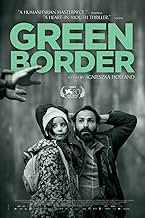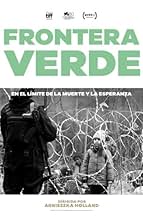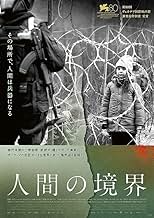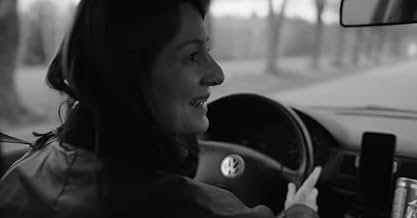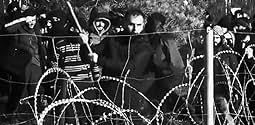AVALIAÇÃO DA IMDb
6,4/10
7,5 mil
SUA AVALIAÇÃO
Uma família de refugiados da Síria, um professor de inglês do Afeganistão e um guarda de fronteira reúnem-se na fronteira entre a Polônia e a Bielorrússia durante a mais recente crise humani... Ler tudoUma família de refugiados da Síria, um professor de inglês do Afeganistão e um guarda de fronteira reúnem-se na fronteira entre a Polônia e a Bielorrússia durante a mais recente crise humanitária na Bielorrússia.Uma família de refugiados da Síria, um professor de inglês do Afeganistão e um guarda de fronteira reúnem-se na fronteira entre a Polônia e a Bielorrússia durante a mais recente crise humanitária na Bielorrússia.
- Direção
- Roteiristas
- Artistas
- Prêmios
- 30 vitórias e 32 indicações no total
Behi Djanati Atai
- Leïla
- (as Behi Djanati Ataï)
Muhammad Al Rashi
- Grandpa
- (as Al Rashi Mohamad)
Michal Zielinski
- Sasza
- (as Michael Zielinski)
- Direção
- Roteiristas
- Elenco e equipe completos
- Produção, bilheteria e muito mais no IMDbPro
6,47.4K
Atividade incomum
Our rating mechanism has detected unusual voting activity on this title. To preserve the reliability of our rating system, an alternate weighting calculation has been applied.
Avaliações em destaque
Polish director Agnieszka Holland's impassioned examination of the European refugee crisis from her nation's perspective. Holland's film, which she also co-wrote, is a sprawling work which begins by following a family of Syrians who are trying to the EU through Russian dominated Belarus. From there, the movie weaves it way to the Border Guards and, eventually, ia small band of mostly female Aid workers who give medical and legal assistance to the immigrants.
The structure is a bit daunting even though there are loose connections binding it all together. Cinematographer Tomasz Naumiuk shoots in an austere Black and White with Frédéric Vercheval's brooding score as accompaniment. The large cast is quite good with Maja Ostarszewska a standout as the, perhaps a bit naive Julia, one of the Polish volunteers. Behi Djanati Atai is memorable as a defiant Afghan woman who crosses the border with the Syrians. What knits it together is Holland's vision, which becomes clearer and clearer as the various strands are brought together - while simulataneously being torn assunder.
Holland never flinches from the painful and graphic details of the refugees' plight. They are literal political footballs booted from one side of the border to the other. There are times when the structure doesn't completely work and the filmmaker does dwell a bit on some seemingly extraneous details, but, there is no questioning Holland's fervor - much of it directed at Poland's leadership. It's been a highly controversial film within the nation and its government, and throughout much of Europe.
Unsurprisingly, it was NOT Poland's official submission to this past year's Academy Awards.
At 75, Holland (an Oscar nominee for EUROPA EUROPA) has made a daring - some would say angry - film. A stunning work of art that demands to be seen.
The structure is a bit daunting even though there are loose connections binding it all together. Cinematographer Tomasz Naumiuk shoots in an austere Black and White with Frédéric Vercheval's brooding score as accompaniment. The large cast is quite good with Maja Ostarszewska a standout as the, perhaps a bit naive Julia, one of the Polish volunteers. Behi Djanati Atai is memorable as a defiant Afghan woman who crosses the border with the Syrians. What knits it together is Holland's vision, which becomes clearer and clearer as the various strands are brought together - while simulataneously being torn assunder.
Holland never flinches from the painful and graphic details of the refugees' plight. They are literal political footballs booted from one side of the border to the other. There are times when the structure doesn't completely work and the filmmaker does dwell a bit on some seemingly extraneous details, but, there is no questioning Holland's fervor - much of it directed at Poland's leadership. It's been a highly controversial film within the nation and its government, and throughout much of Europe.
Unsurprisingly, it was NOT Poland's official submission to this past year's Academy Awards.
At 75, Holland (an Oscar nominee for EUROPA EUROPA) has made a daring - some would say angry - film. A stunning work of art that demands to be seen.
Agnieszka Holland's *Green Border* (*Zielona granica*) is a powerful and unflinching portrayal of the humanitarian crisis at the Polish-Belarusian border. Through the intersecting stories of a Syrian refugee family, an Afghan English teacher, and a conflicted border guard, the film sheds light on the harrowing realities faced by those caught in the no-man's-land of geopolitical conflict.
Jalal Altawil delivers a heart-wrenching performance as the father of the Syrian family, embodying both resilience and despair. Maja Ostaszewska portrays the Afghan teacher with a quiet strength that anchors her story, while Behi Djanati Atai adds nuance to the role of a border guard torn between duty and conscience. Together, their narratives create a tapestry of human suffering, hope, and moral ambiguity.
Holland's direction is both compassionate and unrelenting, refusing to shy away from the brutality of the situation. The stark, desolate visuals of the borderlands, captured with haunting beauty, underscore the desperation of those trapped in this liminal space. The screenplay, co-written by Holland, Maciej Pisuk, and Gabriela Lazarkiewicz, navigates complex themes of humanity, politics, and survival without resorting to simplifications or clichés.
At 2 hours and 32 minutes, the film's runtime allows for a thorough exploration of its characters and their plights, though some viewers may find the pacing demanding. Nevertheless, the emotional impact and urgent relevance of *Green Border* make it a vital watch.
This is a film for those who seek stories that challenge and provoke, offering no easy answers but demanding empathy and reflection. *Green Border* is a haunting reminder of the human cost of political indifference.
Rating: 8/10 - A deeply moving and essential portrayal of a modern humanitarian crisis.
Jalal Altawil delivers a heart-wrenching performance as the father of the Syrian family, embodying both resilience and despair. Maja Ostaszewska portrays the Afghan teacher with a quiet strength that anchors her story, while Behi Djanati Atai adds nuance to the role of a border guard torn between duty and conscience. Together, their narratives create a tapestry of human suffering, hope, and moral ambiguity.
Holland's direction is both compassionate and unrelenting, refusing to shy away from the brutality of the situation. The stark, desolate visuals of the borderlands, captured with haunting beauty, underscore the desperation of those trapped in this liminal space. The screenplay, co-written by Holland, Maciej Pisuk, and Gabriela Lazarkiewicz, navigates complex themes of humanity, politics, and survival without resorting to simplifications or clichés.
At 2 hours and 32 minutes, the film's runtime allows for a thorough exploration of its characters and their plights, though some viewers may find the pacing demanding. Nevertheless, the emotional impact and urgent relevance of *Green Border* make it a vital watch.
This is a film for those who seek stories that challenge and provoke, offering no easy answers but demanding empathy and reflection. *Green Border* is a haunting reminder of the human cost of political indifference.
Rating: 8/10 - A deeply moving and essential portrayal of a modern humanitarian crisis.
Movies like "Green Border" are tricky. If you're watching it in the first place, you likely already have some awareness of and empathy for the plight of refugees and migrants who are being demonized around the world. If you need to be convinced that they are deserving of empathy, you're probably not ever going to watch this movie. So the onslaught of suffering we are subjected to feels like punishment, like we're being lectured on something we already believe.
I thought I might bail on this movie at about the 30-minute mark. That first half hour is misery porn about a Syrian family trying to make its way across the Belarus/Poland border and the inhumanity they face. I felt for them, but didn't want to watch a movie that was just going to throw in my face misery that I already feel bad about. But veteran director Agnieska Holland had something more varied in mind for this film, and the perspective switches multiple times to show events from the perspective of a Polish border guard, a group of activists trying to help the refugees, and a psychotherapist who turns her outrage into action and joins the cause.
"Green Border" is a well made movie, and it's pretty engrossing. But there's something a little too narratively slick about it. I've seen documentaries about the refugee crisis, and though it tries, this movie doesn't capture the visceral, life or death desperation of those films. Maybe it's not fair to ask it to, but it's hard to feel completely satisfied by this movie's fictional version of what's happening in the world when the real thing is being documented and made available. If this had been my first exposure to the refugee crisis, I might have found it to be more searing than I did. And there's something a little naive about it too. It's very simple in its ideology. All of the refugees and anyone on their side is good, anyone working against the refugees is bad, and there's no nuance or attempt to address the complicated social impact of large masses of people entering countries without the resources to support them. In this movie's version, if we all just open our borders and welcome whoever wants to come in, we'll all live together in a utopian society and won't that be wonderful. But that's not the way the world works. I'm one of the first to wish it did, but I'm more realistic than that. I wish this movie had been more realistic about it too.
But all that aside, it is still a very effective movie, and I found myself more enraged than depressed by it. I'm afraid I might be one of the ineffectual liberals criticized in the movie, people who feel bad about what's happening but don't actually do anything about it. To be fair to myself, I'm not sure exactly what it is I'm supposed to be doing, but still, movies like this make me want to just go out in the world and help someone, anyone, so I guess this film serves a valuable purpose in that regard.
Grade: A.
I thought I might bail on this movie at about the 30-minute mark. That first half hour is misery porn about a Syrian family trying to make its way across the Belarus/Poland border and the inhumanity they face. I felt for them, but didn't want to watch a movie that was just going to throw in my face misery that I already feel bad about. But veteran director Agnieska Holland had something more varied in mind for this film, and the perspective switches multiple times to show events from the perspective of a Polish border guard, a group of activists trying to help the refugees, and a psychotherapist who turns her outrage into action and joins the cause.
"Green Border" is a well made movie, and it's pretty engrossing. But there's something a little too narratively slick about it. I've seen documentaries about the refugee crisis, and though it tries, this movie doesn't capture the visceral, life or death desperation of those films. Maybe it's not fair to ask it to, but it's hard to feel completely satisfied by this movie's fictional version of what's happening in the world when the real thing is being documented and made available. If this had been my first exposure to the refugee crisis, I might have found it to be more searing than I did. And there's something a little naive about it too. It's very simple in its ideology. All of the refugees and anyone on their side is good, anyone working against the refugees is bad, and there's no nuance or attempt to address the complicated social impact of large masses of people entering countries without the resources to support them. In this movie's version, if we all just open our borders and welcome whoever wants to come in, we'll all live together in a utopian society and won't that be wonderful. But that's not the way the world works. I'm one of the first to wish it did, but I'm more realistic than that. I wish this movie had been more realistic about it too.
But all that aside, it is still a very effective movie, and I found myself more enraged than depressed by it. I'm afraid I might be one of the ineffectual liberals criticized in the movie, people who feel bad about what's happening but don't actually do anything about it. To be fair to myself, I'm not sure exactly what it is I'm supposed to be doing, but still, movies like this make me want to just go out in the world and help someone, anyone, so I guess this film serves a valuable purpose in that regard.
Grade: A.
I won't deny that I was prompted to watch the film right after the Polish premiere by how extremists in the government try to use it to their advantage by throwing around statements that are subject to Godwin's law in normal discourse, which at the same time obscures the message and power of the picture. The second reason was my interest in the subject matter covered - for the past two years I have been hearing about the events that have been fictionalized in this powerful and emotionally stirring film. The situation in Ukraine, Belarus, the constant information war and disinformation on the part of Belarus and Russia, the visa scandal in which the government is involved, the dying refugees in the border area between Poland and Belarus.
The visual layer of the film is flawless. The story is told in an intriguing, engaging way, and there are several memorable moments, including some dialogues that, curiously enough, show the surprising self-irony of the middle class supporting the neoliberal opposition. The script and acting were not always flawless, although this did not detract too much from the overall reception of the film, as the film defends itself primarily through its imagery. It is truly unforgettable. I recommend it from the bottom of my heart.
The visual layer of the film is flawless. The story is told in an intriguing, engaging way, and there are several memorable moments, including some dialogues that, curiously enough, show the surprising self-irony of the middle class supporting the neoliberal opposition. The script and acting were not always flawless, although this did not detract too much from the overall reception of the film, as the film defends itself primarily through its imagery. It is truly unforgettable. I recommend it from the bottom of my heart.
This is the second film I've seen this week with Tomasz Wlosok. Earlier, he was in Julia von Heinz's tragic-comedy "Treasure" (2024) with a far lighter and fluffier role than he has here, as a Polish border guard. He is part of a team charged with repelling refugees trying to cross into the EU from Belarus. On that front, we are introduced to travellers who have been lulled into thinking their flight from Syria and Afghanistan will be a dawdle. An expensive one, yes, but a straightforward flight to Minsk on a comfortable Turkish aircraft then a bus to Poland thence on to wherever. Sadly, they soon realise that their bought-and-paid-for journey merely inserts them into a game of human table tennis between the military on both sides of a border - only it's coiled barbed wire rather than a net. It doesn't matter what their predicament - injured, pregnant, old, vulnerable - they are systematically robbed, starved and dehydrated. There is some hope for them, though, as Polish activists try to help them and get them on the register for asylum. That, however, requires that they be reported to the police and then to the guard and so we are back with handsome Tomasz ("Jan") again. Their journey is riddled with peril and that's harrowing at times, but somehow not quite so difficult to stomach as the behaviour of the people in uniform bending or breaking the rules from above to ensure a minimum of these people ever made it past the forests of the 250-odd miles of border. Politics plays it's part too - the government of one nation accused of using these people as "live bullets", the other of sowing seeds of dissent within an EU where rising nationalism is polarising societal attitudes. In the end, it is a really rather brutal assessment of human nature at it's worst whilst also illustrating just what lengths decent folks will go to, and the risks they will take, to do what they feel is right. The intensity of the camerawork - especially in the woods, and the audio editing give this an added piquancy that makes their plight all the more terrifying, frustrating and deadly. I didn't quite get the point of the anecdote at the end. I'm not sure that concluding assertion took into consideration the historic cultural and traditional links between neighbouring Poland and Ukraine as distinct from those fleeing from Syria, but it does offer us considerable food for thought on what is the right thing to do without imposing director Holland's personal view too overwhelmingly on the issues faced by countries that might be legitimately concerned about the impact on their nation, economy and culture of large scale migration. It's not an easy film to watch, it's violent and nasty - but compelling.
Você sabia?
- CuriosidadesAt 00:11:12, a refugee checks their location using an OpenStreetMap-based map on a smartphone. The location shown is the Poland-Belarus border at 52.61281 23.74398.
Principais escolhas
Faça login para avaliar e ver a lista de recomendações personalizadas
- How long is Green Border?Fornecido pela Alexa
Detalhes
- Data de lançamento
- Países de origem
- Idiomas
- Também conhecido como
- Green Border
- Locações de filme
- Empresas de produção
- Consulte mais créditos da empresa na IMDbPro
Bilheteria
- Faturamento bruto nos EUA e Canadá
- US$ 96.595
- Fim de semana de estreia nos EUA e Canadá
- US$ 7.305
- 23 de jun. de 2024
- Faturamento bruto mundial
- US$ 4.240.827
- Tempo de duração
- 2 h 32 min(152 min)
- Cor
Contribua para esta página
Sugerir uma alteração ou adicionar conteúdo ausente




